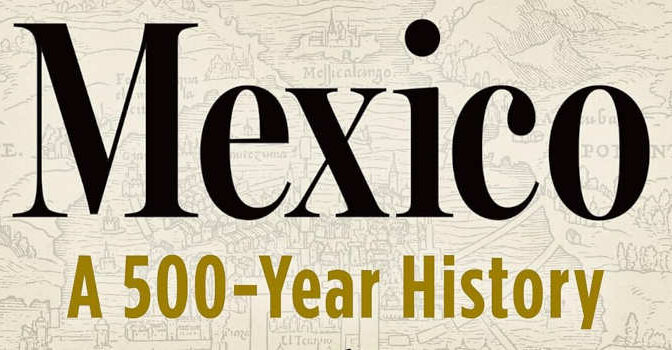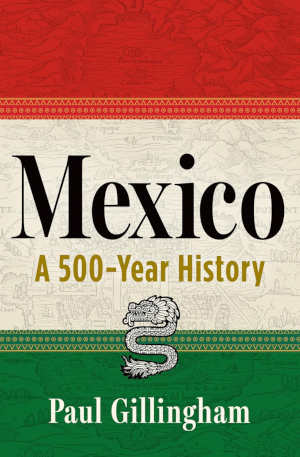Paul Gillingham Mexico A 500-Year History review and information of the content of the new book by the American historian and professor of Latin American History at Northwestern University. Grove Atlantic will publish the new Paul Gillingham history book, on November 18, 2025.
Paul Gillingham Mexico A 500-Year History review
- “The result of a long and erudite engagement with what Mexico has meant historically, Paul Gillingham’s book offers a unique and enlightening view of the five centuries that made Mexico. The local, the national, and the global meet, blending the big with the minute. Wonderful storytelling, one of those rare happenstances of informing, explaining, and delighting.” (Mauricio Tenorio, Professor, The University of Chicago)
- “This is the history of a country at the center of the world, from the precarious beginnings of colonialism to the violent throes of democracy. Gillingham has written a one-of-a-kind book, populated by large and small characters, spanning five hundred years of conflict and resilience, all in a masterful prose and a sharp, intelligent dialogue with the reader. The universality and uniqueness of this story makes us all Mexican.” (Pablo Piccato, Professor of History, Columbia University)
- “In taking on half a millennium of Mexican history, Gillingham deftly maneuvers to convey both its ironies and complexities. It is a wild ride.” (Erika Pani, Professor of History, El Colegio de Mexico)
Mexico
A 500-Year History
- Author: Paul Hillingham (United States)
- Book type: Mexican history
- Publisher: Grove Atlantic
- Released: 18 November 2025
- Length: 752 pages
- Format: hardback / ebook
- Prize: € 35.00
- Order book from: Amazon
Blurb of the new book about the history of Mexico
From acclaimed and prize-winning historian Paul Gillingham, a rich and vibrant history of one of the world’s most diverse, politically ground-breaking, and influential of countries.
At the beginning of his masterful work of scholarship and narration, Paul Gillingham writes, from its outset “Mexico was more profoundly, globally hybrid than anywhere else in the prior history of the world.” Over the ensuing five centuries, Mexicans have prefigured and shaped the course of human lives across the globe.
Gillingham begins in 1511 with the dramatic shipwreck of two Spanish sailors in the far south of Mexico. Ten years later Hernán Cortés led an army of European adventurers and indigenous rebels to seize the legendary island city of Tenochtitlán, the center of Montezuma’s empire, the largest in the Americas. The capture of the future Mexico City was, more than an extraordinary military event, the collision of two long-separated worlds, radically different in everything from biota to urban planning. Spaniards discovered tomatoes, chocolate, and a city larger and more sophisticated than anything they had ever seen. Mexicans discovered horses, wheels, and lethal germs, sparking a cataclysmic century of disease that wiped out a majority of the pre-existing population and led to a unique recombination of European and indigenous cultures. The industrial mining of Mexico’s silver transformed the wealth and trade of the world. Mexico’s independence from the Spanish Empire in 1821 led to a calamitous mid-century war with the United States and one of the first great social revolutions that brought peace for Mexicans throughout many of the global horrors of the 20th century, before the country itself collapsed into the violence of the cartels and a refugee crisis in the 2000s.
The history of Mexico has been, Gillingham shows, one of suffering empire but also of overcoming. Through it all the country set new standards for inclusivity, for progressive social policies, for artistic expression, for adroitly balancing dictatorship and democracy. While racial divides endured, so too did indigenous peoples, who enjoyed rights unthinkable in the United States. Mexico was among the first countries to abolish slavery in 1829, and Mexicans elected North America’s first Black president, Vicente Guerrero, its only indigenous president, Benito Juárez, and its only woman president, Claudia Sheinbaum.
As elegantly written as it is powerful in scope, rich in character and anecdote, Mexico uses the latest research to dazzling effect, showing how often Mexico has been a dynamic and vital shaper of world affairs.
Paul Gillingham is the author of the prize-winning Cuauhtémoc’s Bones and Unrevolutionary Mexico. He is Professor of Latin American History at Northwestern University.

